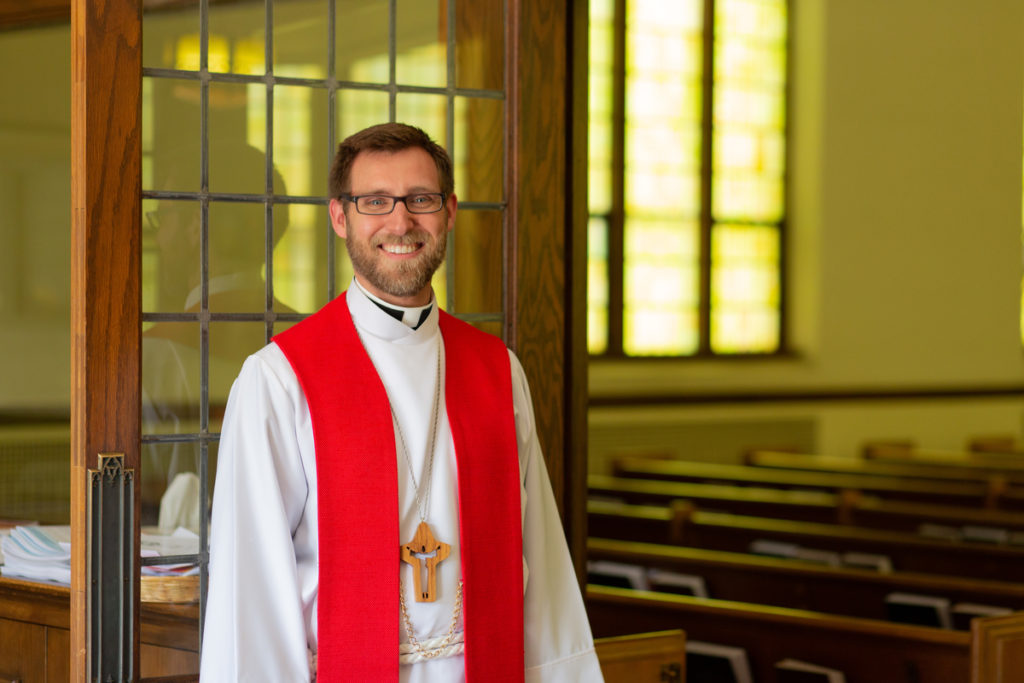
It is now old news that the issue of abortion in the United States, which has long simmered on medium heat in our national discourse, has recently boiled over. Because of the Supreme Court’s recent decision in Dobbs v. Jackson Women’s Health, which overturned Roe (1973) and Casey (1992), individual states now possess increased ability to restrict abortion, including banning the practice outright. Though this is a significant victory for those who consider themselves prolife, the issue of the legality of abortion now simply shifts to a more local level. Even so, many abortion rights advocates are outraged, which has prompted commentary and statements from many, including church leadership.
It had been over twenty years since I first read the ELCA social statement on abortion when I was recently asked to do so again. The first case was for a class as a college sophomore. The second, the result of which is this reflection, was in response to ELCA Presiding Bishop Elizabeth Eaton’s references to this statement in response to shifting abortion policy in the United States. My reaction after both readings of this statement was the same: Though far from what I would consider a perfect document, the 1991 social statement on abortion is much more life-affirming than one might expect. The development of this statement involved input from people of different viewpoints who listened to each other and worked hard to produce a document that, while not satisfying everyone, incorporated various concerns in a balanced manner.
Nevertheless, it is widely acknowledged that the ELCA statement on abortion, one of the earliest such social statements considered and adopted,[1] has not been without controversy in the history of the ELCA and has been subject to controversial “interpretation.” The question of how or whether to harmonize the content of this statement with the health plan coverage provided by the ELCA Board of Pensions (now called Portico) was one issue that early on created for some a lack of trust in the leadership of the ELCA. Among these is Russell Saltzman, former ELCA pastor and now member of the Roman Catholic Church, who offered the following comments in 2010 in the wake of the ELCA’s policy change concerning pastors in same-sex relationships:
My real disaffection with the ELCA didn’t start with sex. It began in earnest over the ELCA abortion statement and the subsequent decision by the national council to treat elective abortion for pastors and dependents as a reimbursable medical expense under the church health plan. From the abortion statement, the church said to value my baptism as an infant regards my conception by step-siblings as a morally justifiable reason for terminating the pregnancy that became me at the baptismal font. From the schedule of benefits by the health plan, had my birth-parents in any way been covered under the ELCA health plan, my church would have paid to do it.[2]
Comments such as these, the recent Supreme Court decision, and Bishop Eaton’s communications invite us to explore more fully what the 1991 social statement on abortion really says in its fullness. In fairness, documents such as this touch on a variety of issues and make several assertions. Nevertheless, one must ask whether Bishop Eaton’s comments about the statement accurately reflect the spirit of the document.
Reviewing Bishop Eaton’s Communications
On May 30, 2019, Bishop Eaton issued a communication in response to various attempts by states “to restrict access to legal abortion,”[3] in which she invited her readers to revisit the ELCA social statement on abortion. In the first incarnation of this message, she stated that “this church seeks to travel a moderating path by supporting abortion as a last resort for pregnancies that are unsafe or a result of rape or incest.”[4] This is a fairly accurate summary of what the ELCA statement says. Not long after this communication went public, however, she issued a revised statement, nearly identical, but which omitted the words “for pregnancies that are unsafe or a result of rape or incest.”
In response to the leaked draft of Dobbs in May of 2022, she issued further comments about abortion, including many references to the 1991 social statement. She claimed that the content of the draft opinion “contradicts the church’s teaching” and that the 1991 statement affirms that “abortion must be legal, regulated and accessible.”[5]
Finally, after the actual opinion, which does not differ significantly from the draft, was released in June of 2022, Bishop Eaton emphasized again that the ELCA’s position is that “the practice (of abortion) should be legal” in spite of “deep concern” over the number of induced abortions.[6] Further, she expressed her concern that “Overturning Roe v. Wade and placing decisions about abortion regulation at the state level encumbers and endangers the lives of all persons who need to make decisions about unexpected pregnancies.”[7]
What the Statement Says
How does one effectively summarize the content of a ten-page statement, especially one that seeks a nuanced approach to a difficult moral issue? This is a challenging task, to be sure, and Bishop Eaton does communicate some truth in the parts of the statement that she cites. In her communications, she quotes liberally from the 1991 social statement. Yet there are many things in this statement that she overlooks and in at least one case even misrepresents.
Before addressing the issue of the legality of abortion, it is important to note this statement’s expression of the value of unborn life: “Human life in all phases of its development is God-given and, therefore, has intrinsic value, worth, and dignity. Guided by God’s Law, which orders and preserves life, human beings are called to respect and care for the life that God gives.”[8] It goes on to state that “We mourn the loss of life (through abortion) that God has created” and that “The strong Christian presumption is to preserve and protect life. Abortion ought to be an option only of last resort.”[9] As a consequence of this commitment to preserve and protect life, the statement declares that the ELCA “in most circumstances, encourages women with unintended pregnancies to continue the pregnancy.”[10]
The social statement on abortion does speak of certain situations where it can be “morally responsible” for a woman to obtain an abortion, such as in cases of rape, incest, or extreme fetal abnormality.[11] Even so, however, the ELCA “opposes ending intrauterine life when a fetus is developed enough to live outside a uterus with the aid of reasonable and necessary technology.”[12]
While the social statement seeks to balance the importance of the life of an unborn child and the life of the woman bearing that child, it clearly states that “government has a legitimate role in regulating abortion.”[13] In fact, it states that the ELCA opposes “the total lack of regulation of abortion.”[14] To be sure, it also opposes “legislation that would outlaw abortion in all circumstances” and laws that “deny access to safe and affordable services for morally justifiable abortions.”[15]
This all leads, however, to a concluding paragraph about the regulation of abortion, which reads as follows:
The position of this church is that, in cases where the life of the mother is threatened, where pregnancy results from rape or incest, or where the embryo or fetus has lethal abnormalities incompatible with life, abortion prior to viability should not be prohibited by law or by lack of public funding of abortions for low income women. On the other hand, this church supports legislation that prohibits abortions that are performed after the fetus is determined to be viable, except when the mother’s life is threatened or when lethal abnormalities indicate the prospective newborn will die very soon.
Beyond these situations, this church neither supports nor opposes laws prohibiting abortion.[16]
I suspect that many would be surprised to know that the ELCA social statement on abortion directly opposes abortion after viability and even supports legislation that prohibits abortion after viability, only considering abortion “morally responsible” in the difficult circumstances above. Bishop Eaton’s assertion that abortion must be “legal, regulated and accessible” can only be responsibly read to apply to these difficult circumstances of saving the life of the mother, rape, incest, and embryonic or fetal abnormalities incompatible with life. Similarly, if the Dobbs opinion “contradicts the church’s teaching” as she claims, it would only do so if individual states enact laws that prohibit abortion in these difficult circumstances.
Getting to the Root of the Matter
As mentioned, the 1991 social statement touches on many other important issues involved in the abortion debate, such as supporting pregnant women in their needs, encouraging adoption and foster care, the use of contraceptives, and encouraging congregations to be places of hospitality for women facing difficult circumstances. But the foundational issue for our society in its discussion of abortion is the very thing that leads to the perceived need for abortion: sexual intercourse and its appropriate context.
It might also surprise readers of the statement to learn that the ELCA states the following: “Marriage is the appropriate context for sexual intercourse. This continues to be the position of this church.”[17] Moreover, it affirms that congregations and church schools should emphasize values such as “abstinence from sexual intercourse outside marriage” and that “young men and young women be taught to exercise their sexuality responsibly.”[18]
Clearly, the authors of the 1991 ELCA social statement on abortion recognized the challenges posed by a society that had by then begun to face the shockwaves created by the sexual revolution. The over three decades since 1991 have seen even further movement away from the vision that marriage is the appropriate context for sexual intercourse. Sex is most often portrayed in entertainment media as an inevitable part of taking a relationship to another level and most always as purely a part of adult fulfillment and pleasure, detached from concern for procreation. Any life created by these sexual encounters is viewed as an inconvenience and unfortunate consequence.
I encourage ELCA leadership to study this social statement on abortion and to take seriously what it actually says. I also encourage other Lutherans to do so. There are some aspects of this statement with which I and others disagree, but there are many things in this statement worthy of our consideration and affirmation. Significantly, if our society is to address the crisis of abortion, we must not only address the desire for abortion as it arises. We must address the underlying issue and lift up the call of God for sex to be used responsibly, between a man and a woman who are married and committed to nurturing life created by that loving union. Regardless of what Lutheran church bodies we are members, the ELCA social statement on abortion can be an encouragement to us in lifting up that important vision.
[1] According to the social statement itself, “…adopted by a more than two-thirds majority vote at the second biennial Churchwide Assembly of the Evangelical Lutheran Church in America, meeting in Orlando, Florida, August 28-September 4, 1991.”
[2] Russell E. Saltzman, “From the ELCA to the NALC,” First Things, https://www.firstthings.com/blogs/firstthoughts/2010/12/from-the-elca-to-the-nalc, Accessed 7/2/2022.
[3] Elizabeth Eaton, open letter, May 30, 2019.
[4] Ibid.
[5] Elizabeth Eaton, open letter, May 17, 2022.
[6] Elizabeth Eaton, open letter, June 24, 2022.
[7] Ibid.
[8] Evangelical Lutheran Church in America, “A Social Statement on Abortion,” 1991, p. 2-3.
[9] Ibid., p. 3-4.
[10] Ibid., p. 6.
[11] Ibid., p. 7.
[12] Ibid.
[13] Ibid., p. 9.
[14] Ibid.
[15] Ibid.
[16] Ibid., p. 10. Emphasis added.
[17] Ibid., p. 4.
[18] Ibid., p. 5.




















